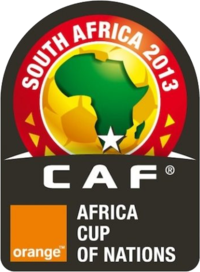2013 Africa Cup of Nations: Second Qualifying Round (Second-Leg)
 The final games to confirm the fifteen qualifying teams joining hosts South Africa in January 2013, took place over the weekend of Saturday 13 and Sunday 14 October 2012.
The final games to confirm the fifteen qualifying teams joining hosts South Africa in January 2013, took place over the weekend of Saturday 13 and Sunday 14 October 2012.
There were two big aggregate wins from the fifteen matches. The first saw Mali (CAF ranking 3) already 3-0 ahead from the First Leg, complete a 7-1 aggregate win with a 4-1 victory over Botswana (34) in Lobatse. In the second, Liberia (27) and Nigeria (13) had played out a 2-2 draw in Paynesville. However, in the Second Leg it was never a close affair. Efe Ambrose scored in the opening minute and Ahmed Musa put Nigeria two up and in control before the break. Chelsea forward Victor Moses got a brace in the second-half, with goals from fellow Blue John Obi Mikel and Ikechukwu Uche ensuring a 6-1 victory for Nigeria.
However, there were two games which created the most headlines. Côte d’Ivoire (1) went into the Second-Leg fixture in Dakar with a 4-2 lead and put the tie further beyond Senegal (15) with two goals from Didier Drogba. However, when the second goal (a penalty) was scored, violence erupted in the stadium. With players and some fans seeking refuge in the centre-circle the game was suspended and CAF allowed the result to stand with Côte d’Ivoire progressing 6-2 on aggregate. The other game which received a great deal of attention, saw Cameroon (16) lose 3-2 on aggregate to Cape Verde (10). Cape Verde had a 2-0 lead going into the game at the Stade Ahmadou Ahidjo in Yaoundé and went further ahead in the tie with a goal from Nhuck on twelve minutes. Achille Emana got one back for Cameroon ten minutes later, but they were unable to break down Cape Verde until a goal from Fabrice Olinga in time added-on gave Cameroon a 2-1 win on the night, but on aggregate missed out on the Finals again.
There were also a number of other teams who caused upsets as lower ranked sides “put one over” on those above them. Niger (42) had lost their First-Leg game against Guinea (12) 1-0, but in the return game in Niamey, two second-half goals saw Niger through with Chikoto Mohamed and Issoufou Boubacar Garba, the goal-scoring heroes. Togo (24) had drawn 1-1 with Gabon (8) ahead of the Second-Leg game. At the Stade de Kégué in Lomé, Togo went ahead through Dové Wome, a lead that was doubled with an effort from Spurs striker Emmanuel Adebayor. 2012 Co-hosts Gabon threatened to get back into the tie with a goal on eighty minutes from ex-Hull City striker Daniel Cousin. However, Togo held on for a 3-2 aggregate win. Burkina Faso (23) lost 1-0 to the Central African Republic [CAR] (9) in Bangui and found themselves 2-0 down on aggregate when David Manga opening the scoring for CAR in the Second-Leg. However, Alain Traoré pulled a goal back on eighteen minutes and the tie was level just before half-time through a Moumouni Dagano penalty. The incredible comeback was complete by Burkina Faso when in time added-on, Alain Traoré got his second to send the home fans into wild celebration.
Three games were decided by the away-goals rule. Facing a 3-1 deficit from the First Leg, Angola (20) overcame Zimbabwe (21) after two goals from Manucho in the opening ten minutes in Luanda levelled the tie at 3-3. Having drawn 2-2 against Sierra Leone (14), Tunisia (7) were always going to be favourites to take this tie, but they had to settle for a 0-0 to see them through. Sudan (29) lead 5-3 going into the game against Ethiopia in Addis Ababa and at half-time must have thought a place in the Finals was a real possibility with the score at 0-0. However, goals from Adane Girma and Saladin Said gave the advantage to the Ethiopians.
One game was not able to be settled by away-goals and that involved Zambia (6) and Uganda (22). Having won the First-Leg 1-0, the holders Zambia found themselves behind in the Second-Leg, when Geofrey Massa put Uganda ahead in the first-half. However, neither side could find a decisive goal, and it took penalties to separate the teams, with Zambia emerging 9-8 winners and so progressing to defend their title in South Africa in January 2013.
Elsewhere, Ghana (4) completed a 3-0 aggregate win over Malawi (26) and Algeria (2) went through by the same margin against Libya (11). Congo DR (30) were 4-0 up from the First-Leg against Equatorial Guinea, and despite a 2-1 loss in Malabo, went through 5-2 on aggregate. Morocco (18) had the comeback of the round over Mozambique (28). The Moroccans were 2-0 down before the return game in Marrakech. Abdelaziz Barrada gave Morocco a 1-0 half-time lead, but had to wait until the sixty fourth minute when a penalty from Houssine Kharja levelled up the tie. Youssef El-Arabi put Morocco ahead with five minutes to go and a 4-2 aggregate win was sealed with a goal in time added-on from Nordin Amrabat.
The sixteen teams who will take part in the Finals in January 2013 are as follows:
| Algeria | Angola | Burkina Faso | Cape Verde |
| Congo DR | Côte d’Ivoire | Ethiopia | Ghana |
| Mali | Morocco | Niger | Nigeria |
| South Africa | Togo | Tunisia | Zambia |
They now await the draw (which takes place on 21 October 2012) to see how the Groups will look for the Finals in South Africa.
[Note: CAF Ranking as at 03 October 2012]